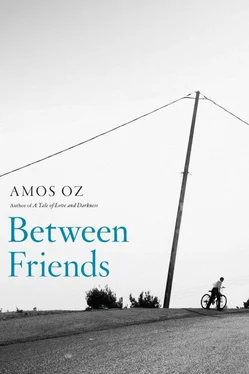To this letter, which was waiting in her mailbox, Osnat chose not to reply. She read it twice, folded it up, and put it in a drawer. Now she’s standing utterly still, looking out of her window. Three kittens are by the fence: one is busy biting its paw; another is crouching or maybe dozing, but with ears pricked suspiciously, as if catching a thin sound; and the third is chasing its tail, constantly falling over and rolling softly onto its back because it’s so young. A gentle breeze is blowing, just enough to cool a cup of tea. Osnat moves away from the window and sits down on the sofa, back straight, hands on her knees, eyes closed. It’ll be evening soon and she’ll listen to light music on the radio and read a book. Then she’ll undress, fold her after-work clothes neatly, lay out tomorrow’s work clothes, shower, get into bed, and go to sleep. Her nights are dreamless now, and she wakes before the alarm clock rings. The pigeons wake her.
IN THE EARLY HOURS, the first rain of the season began to fall on the kibbutz houses, its fields and orchards. The fresh smell of damp earth and clean leaves filled the air. The rain rattled along the gutters and washed the dust off the red roofs and tin sheds. At dawn, a gentle mist enveloped the buildings, and the flowers in the gardens sparkled with beads of water. A redundant lawn sprinkler continued its sputtering. A child’s wet red tricycle stood diagonally across a path. From the treetops came the sharp, astonished cries of birds.
The rain woke Nahum Asherov from a fitful sleep. For several moments after waking, he thought he heard tapping on the shutters as if someone had come to tell him something. He sat up in his bed and listened intently until he realized that the first rain had come. Today, he’d go there, sit Edna down, look her directly in the eyes, and speak to her. About everything. And to David Dagan, too. He couldn’t just let it pass.
But what could he actually say to him? Or to her?
Nahum Asherov, a widower of about fifty, was Kibbutz Yekhat’s electrician. Edna was his only remaining child after his older son, Yishai, had been killed a few years earlier in a retaliatory raid. A strong-minded young woman, black-eyed and olive-skinned, she had turned seventeen in the spring and was a senior at the kibbutz school. Every afternoon she would come from the dorm room she shared with three other girls to visit her father. She would sit across from him in an armchair, hugging her shoulders as if she were always cold. Even in summer, she would hug herself that way. She would stay with him for about an hour until dusk fell, make coffee, prepare them a plate of peeled, sliced fruit, and they would chat quietly about the news on the radio or her studies, before she left to spend the rest of the evening with her friends, or perhaps without them. Nahum didn’t know and didn’t ask about her social life, and she didn’t volunteer. He once heard something about a fleeting relationship with Dubi the lifeguard, but the rumor died down. He and his daughter never talked about themselves, except for superficial things. Edna would say, for example, “You have to go to the clinic. I don’t like that cough of yours.”
Nahum would say, “We’ll see. Maybe next week. This week we’re installing a new generator in the brooder house at the chicken coop.”
Sometimes they would talk about music, which they both loved. Sometimes they didn’t talk at all, but played Schubert on the old gramophone. They never spoke about the death of Edna’s mother or brother. Nor did they bring up childhood memories, or future plans. They had an unspoken agreement not to touch on feelings, nor to touch each other. Not even lightly: not a hand on a shoulder, not the brush of fingers on an arm. Standing at the door, about to leave, Edna would say, “Bye, Dad. Don’t forget to go to the clinic. I’ll come again tomorrow or the day after.” And Nahum would say, “Yes. Stop by. And take care of yourself. See you later.”
In a few months, Edna, along with all her classmates, would be going into the army. Since she had taught herself Arabic, she would be serving in the Intelligence Corps.
Just a few days before the first rain, Kibbutz Yekhat had been shocked when Edna Asherov packed up her clothes and belongings, left the dorm, and moved in with David Dagan, a teacher her father’s age. David Dagan was one of the kibbutz founders and leaders, an articulate, solidly built man with powerful shoulders, a short, sinewy neck, and a full, neatly trimmed mustache that was threaded with gray. He had a tendency to argue ironically and assertively in a deep voice. Almost everyone accepted his authority when it came to ideological issues, as well as to matters of daily life, mainly because he was endowed with razor-sharp logic and irresistible powers of persuasion. He would interrupt you in the middle of a sentence, put his hand warmly on your shoulder, and say firmly: Hang on; just give me a minute so we can set things straight. He was a devout Marxist, but he loved listening to cantorial music. For many years now, David Dagan had been the kibbutz history teacher. He changed lovers frequently and had six children with four different women from our kibbutz and others in the area.
David Dagan was about fifty and Edna, who had been his student the previous year, was only seventeen. No wonder the gossip swirled wildly around Roni Shindlin’s regular table in the dining hall. Names like Abishag the Shunammite, Lolita, and Bluebeard were tossed about. Yoskeh M. said that such a disgrace shook the very foundations of the school. How could it be — a teacher and his young student? They ought to convene an immediate meeting of the Education Committee. Yoskha disagreed: After all, you can’t argue with love; anyway, we’ve always advocated free love here. And Rivka R. said: How could she do something like this to her father, after all he’s lost? Poor Nahum, he just won’t be able to bear it.
“The entire young generation suddenly wants to go to college,” David Dagan said in his deep voice from his table in the dining hall. “No one wants to work in the fields and orchards anymore.” Then he added harshly, “We have to draw a line somewhere. Does anyone disagree?”
Although everyone in the kibbutz felt sorry for Nahum Asherov, no one spoke up. Behind Edna’s and David Dagan’s backs, they said: It will end in tears. And they said: He is really, really out of line. He was always out of line when it came to women. And as for her, we’re simply shocked.
Nahum said nothing. It seemed to him that everyone who passed him on the kibbutz paths wondered what he would do, or why he wasn’t doing it: Your daughter has been seduced; how can you keep silent? He tried in vain to find comfort in his progressive views of love and freedom. But sorrow, embarrassment, and shame filled his heart. Every morning he would go to his workshop, fix electric lights and cookers, replace old plugs with new ones, repair broken appliances. He would go out to the yard, a long ladder over his shoulder, toolbox in hand, to perform his duties, such as running a new power line to the kindergarten. Morning, noon, and night he would appear in the dining hall to stand mutely in the line at the serving counter, load his meal onto a tray, and then sit down in a corner to eat, preferably in silence. He always sat in the same corner. People spoke to him gently, as if they were speaking to someone who was terminally ill, avoiding any mention or even hint of his problem, and he would answer briefly in his quiet, composed, slightly hoarse voice. To himself he said: One more day and I’ll go and talk to her. And to him, too. After all, she’s still a child.
But time passed. Day after day, Nahum Asherov sat in the electrician’s workshop, shoulders stooped, glasses sliding down his nose, working on the appliances in need of repair: electric kettles, radios, fans. He told himself: After work today, I will definitely go there. I’ll talk to both of them. I’ll say only one or two things, then I’ll grab Edna’s arm and drag her home. Not to her room in the dormitory, but here, home. How will I begin, though? How shall I put it? Will I get angry or should I restrain myself and appeal to their sense of reason and duty? Yet inside, he felt neither anger nor rebuke, only pain and disappointment. David Dagan had sons who were a few years older than Edna and they had already done their military service. Maybe instead of going there, he should talk to one of them? But what exactly would he say?
Читать дальше












